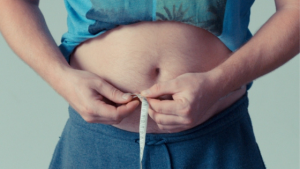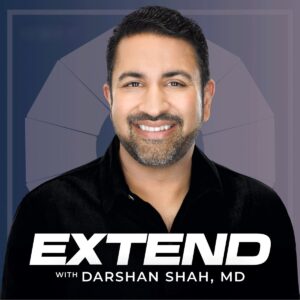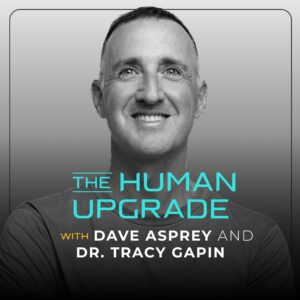
If you’re struggling to see the results you want in your weight loss program, you may be dealing with a testosterone imbalance.
Have you been noticing that the number on the scale keeps increasing recently?
Is your midsection growing at a faster rate than the rest of your body?
Are you struggling to lose those pesky pounds?
Are you dieting and exercising but still not seeing the results you want?
Weight gain is a primary symptom of low testosterone.
If you have low testosterone, you’re more likely to have increased body fat.
And if you have increased body fat, you’re more likely to suffer from low testosterone.
This becomes a vicious cycle that can cause weight gain and prevent weight loss—no matter how hard you diet and exercise. This cycle can also impact other areas of your health, including stress, libido, fertility, energy, and risk for disease.
Let’s go through the basics of testosterone, how T is related to weight, and what you can do about breaking the cycle this week.

What is testosterone?
Testosterone is the “male sex hormone.” It’s the primary hormone that makes a male “manly.” Testosterone is necessary for the initial development of the testes and prostate as well as the ongoing production of sperm and semen.
Along with its sexual function, testosterone has other important purposes in the body as well. It plays a role in everything from libido to muscle development and brain health. Check out these 10 crazy and surprising effects of testosterone here.
A number of factors can cause low testosterone. This includes lifestyle, diet, and exercise. Age also plays a role, as testosterone levels naturally decline with age especially after age 50.
Because testosterone is so critical for sexual and overall health, low levels of testosterone can cause serious health concerns. Symptoms of low testosterone include:
- Weight gain
- Minimized libido (sex drive)
- Low fertility
- Loss of muscle mass
- Weak bones
- Lowered energy
- Brain fog
- Moodiness
- Depression
- Anxiety
- Low self-esteem
- Less body hair
In this post, we’re going to focus on the first symptom: weight gain.
Testosterone has a direct impact on your weight. Higher testosterone means less fat and more muscle. Lower testosterone means more fat and less muscle.
That means that testosterone not only impacts the way we look and feel, but it’s also an important aspect of overall health. Testosterone affects our weight, and weight is a proven indicator of future wellness. Being overweight is directly linked to a number of health problems, including high cholesterol, high blood sugar, type 2 diabetes, heart disease, stroke, and more.
So how does this work?
What is the relationship between weight gain and low testosterone?
A number of studies have proven that weight and testosterone are intimately linked.
Research has shown that low testosterone can cause weight gain. Thus, improving testosterone levels can help with weight loss. A 2013 study found that men taking testosterone supplements saw weight loss as a side effect. Over five years, they each lost an average of 36 pounds and 3.5 inches off the waist. Similar results were iterated in a 2016 study as well.The reverse is also true. Obesity or holding extra weight can actually reduce testosterone levels. One study found that 75% of men who qualified as obese also had hypogonadism, which is when the body produces lower amounts of testosterone.
Losing weight, then, actually shows an increase in testosterone levels—even without testosterone replacement therapy.
So where does this link between weight gain and testosterone come from?
Below are the five primary ways testosterone impacts your weight.
Testosterone plays a role in metabolism.

Testosterone plays a key role in your metabolism, which is the process that turns your carbs, fats, and proteins into energy and fuel.
This is likely because testosterone interacts with insulin and glucose. High levels of testosterone can “eat up” extra glucose. Otherwise, that glucose would be stored as fat cells in the body.
Higher levels of testosterone eat up more of your free-floating sugar to prevent weight gain.
In fact, one study found that men undergoing testosterone treatment showed a significant increase in basal metabolic rate, which is associated with a decrease in lean body mass.
In opposition, fat cells actually metabolize testosterone at a fast rate. The more fat you carry around, the faster you burn through your free testosterone.
So low testosterone causes weight gain… and then that extra fat actually minimizes your free testosterone even more.
Testosterone builds muscle.
Muscle is an important part of weight loss. Your body has to burn up its fat stores in order to build the muscle that you’re creating. Plus, muscle actually burns more calories throughout the day than fatty tissue does.
Having more muscle on your body puts you in a positive cycle of maintained weight.
And testosterone is a key hormone in the process of muscle construction and protein synthesis.

Studies show that testosterone levels increase muscle mass by boosting the body’s ability to produce protein.
This means that higher testosterone can help increase muscle, which minimizes fat storage.
Testosterone also boosts HGH, the human growth hormone. This hormone is used to build or “grow” your muscle.
Studies have shown that men with low testosterone are more likely to have less muscle mass than men with normal T levels. Similarly, men with less muscle mass are at a greater risk for low testosterone levels.
If you want healthy and attractive muscles, you need testosterone.
Testosterone regulates fat-storing estrogen.
Body fat contains an enzyme called aromatase. Aromatase converts testosterone to estradiol, which is a type of estrogen. Aromatase turns T into estrogen, which increases estrogen levels. This then signals the endocrine system to slow the production of testosterone.
Basically, fat tissue creates estrogen. Estrogen stops the production of testosterone.
Thus, reducing fat tissue helps minimize the extra estrogen caused by stored belly fat.
The reverse is also true. When testosterone is low, it increases the production of estrogen.
Estrogen then signals your body to store fat. That’s why women tend to have “softer” features and extra weight, especially around their midsection. The goal of this in females is to store fat so women have extra reserves in case they need to care for a fetus or baby.
Estrogen works the same way in a male. It tells your body to hold on to your fat “in case of emergency.” But in most cases, you’re not all that interested in holding on to extra fat tissue in case the apocalypse hits.

Body fat increases estrogen and lowers T.
And low T increases body fat storage.
Talk about a cycle of weight gain!
Thus, boosting testosterone levels can help minimize fat-storing estrogen. And losing weight can help reduce estradiol, allowing for more free-floating testosterone.
Find out more about the relationship between testosterone and estrogen, especially with regards to the estrogen in your food.
Testosterone reduces cortisol levels.
Cortisol, the “stress hormone,” is proven to increase weight gain. You’ve likely found that during stressful periods of your life, you hold on to a little more poundage than you typically would.
This is because cortisol is released in response to stress and low blood sugar. The goal of cortisol is to suppress inflammation and raise blood sugar levels. This increase in blood sugar actually promotes fat storage, especially around the abdomen.
Cortisol also causes gluconeogenesis, which is when your body transforms its protein reserves into glucose. This basically transforms the protein within your muscles into fatty tissue. You’ll start losing muscle mass and gaining fat—which links back to #2 on this list.
Testosterone and cortisol have an inverse relationship. High cortisol levels cause low levels of testosterone, and high testosterone levels cause low levels of cortisol. Low testosterone allows cortisol to run free, causing an increase in fat storage and gluconeogenesis.

Raising your testosterone levels reduces cortisol, which then minimizes the risk of extra fat storage.
You want high T and low cortisol for optimal health.
Testosterone impacts energy and stamina.
Low energy is a symptom of low testosterone. Fatigue and sluggishness are common indicators of a hormonal imbalance.
Energy is an important part of losing weight. Men with low testosterone often find they don’t have the energy or motivation to workout. When they do exercise, their stamina is so low that the workout isn’t as productive or effective as it could be.
Plus, low energy tends to lead to a more stagnant lifestyle. This means fewer calories burned throughout the day—often accompanied by an increase in the consumption of calories.
This creates a discouraging effect for men looking to lose weight. They can’t bring themselves to the gym no matter how much they want to lose the weight.
Stagnation causes a quick uptick in poundage.
How can you lose weight and increase testosterone?
Because the relationship between weight and testosterone goes both ways, it can be challenging to answer the chicken or the egg question:
Am I gaining weight because of low testosterone or do I have low testosterone because I’m gaining weight?
But the answer to this question ultimately doesn’t matter.
You don’t want weight gain or low testosterone.
So how can you break the cycle?
You have to start by boosting your testosterone.
Whether your weight gain was the cause or effect of low testosterone, losing weight starts by increasing testosterone.
Click here to discover the 13 ways to increase testosterone naturally. You’ll also want to learn about the 7 testosterone boosting myths, so you can make sure your training regimen is on the right track.
Testosterone replacement therapy might be a solution for some men, but it can also have a number of associated risks. There are other healthier ways to try increasing testosterone while losing fat.
Below are a few of the best ways to increase testosterone while losing weight—kill two birds with one stone!
- Lift weights. Resistance exercise builds muscle faster than cardio. As discussed, lean muscle burns fat faster and triggers testosterone production.
- Use high-intensity interval training. Studies show that interval training boosts testosterone better than steady endurance exercise. Interval workouts also tap into fat reserves to eat away at the pounds you’re struggling to lose.
- Stress less. The more you stress, the more cortisol you have in your body. More cortisol means less testosterone. Minimizing your stress is crucial to maintaining a healthy hormone balance. I recommend yoga, because it helps reduce stress while growing muscle mass.
- Maintain a consistent routine. You need to be exercising regularly in order to have a long-term impact on your testosterone levels. The most effective routines include both cardio and weightlifting to boost muscle mass and burn fat simultaneously.
- Don’t shy away from fats. Healthy fats are actually an important part of testosterone production. Study after study shows that low-fat, high-protein diets kill testosterone, minimize muscle mass, and increase fat storage. A balance of fats, carbs, and protein is critical for hormonal health and balance.
Learn more about the Carnivore Diet and Fat Loss here.
Learn other testosterone boosting methods here.
Conclusion
If you’re struggling to get rid of those pesky pounds, low testosterone may have something to do with it. The intimate relationship between testosterone and weight gain can create a vicious cycle that can be hard to break.
But if you boost your testosterone, you’ll increase muscle mass and strength, encourage weight loss, improve energy and stamina… and enrich your overall health and vitality!
I have the ultimate solution to breaking the cycle.
Because I’ve done it myself.
During a routine physical exam, I found out I was 25 pounds overweight. My cholesterol was 245. My doctor showed me my life expectancy chart based on my medical history and health… and it scared the crap out of me.
So I decided to make a change.
I decided to break the cycle.
And I’ve been helping men lose weight and boost testosterone ever since.
Now it’s your turn.
Tracy Gapin, MD, FACS is a board-certified Urologist, world renowned Men’s Health & Performance Expert, Author, and Professional Speaker. Using state-of-the-art biometric monitoring, nutrition and lifestyle intervention, Dr. Gapin coaches Fortune 500 executives and evolutionary leaders of business, sports medicine, and high performance. He specializes in cutting-edge precision medicine with an emphasis on epigenetics, providing men with a personalized path to optimizing health & performance. www.GapinInstitute.com








